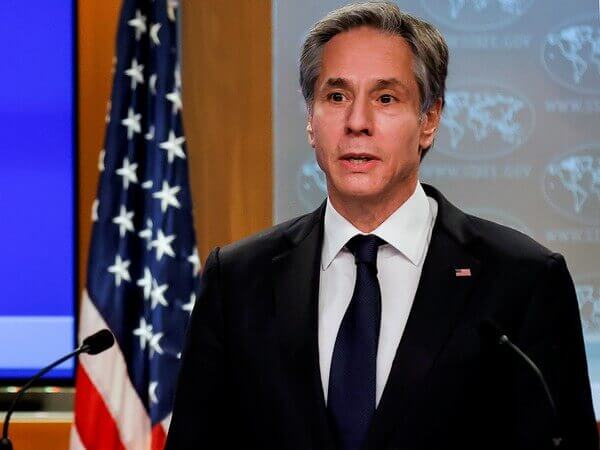United States (US) Secretary of State Antony Blinken met the foreign ministers of the Association of Southeast Asian Nations (ASEAN) on Thursday to address concerns surrounding the US’ developing alliance with the Indo-Pacific.
The meeting’s agenda included a range of pressing regional and international challenges, including the “COVID-19 pandemic, the climate crisis, the urgent need to press the military to end the violence in Burma and adhere to ASEAN’s five-point consensus, and the need to reinforce a free and open Indo-Pacific region.”
Some key points from the meeting are as follows:
- Blinken thanked the ASEAN nations for their support and assistance during the “unprecedented global effort” required to evacuate American and Afghan citizens from Afghanistan.
- He reaffirmed the commitment to “ASEAN centrality” and support for the ASEAN Outlook on the Indo-Pacific.
- The diplomat highlighted the US’ efforts to “lead the global response to the COVID-19 pandemic and build a sustainable recovery that supports both economic growth and climate goals.” He noted that the US has provided ASEAN members with more than $194 million for COVID-19 relief and shared more than 31 million vaccine doses, alongside making 500 million Pfizer COVID-19 doses available to Gavi (The Vaccine Alliance) for distribution by COVAX.
- Blinken extended the US’ support for the Mekong-US Partnership and congratulated ASEAN for collaborating with the Mekong River Commission to host the first ASEAN-MRC Water Security Dialogue.
Additionally, the diplomat announced that the US would soon release a new comprehensive strategy for the broader Indo-Pacific region. The strategy would encompass “our [US-ASEAN] shared vision for a free, open, interconnected, resilient and secure region, and it will reflect Southeast Asia’s importance to the Indo-Pacific region and the critical role that ASEAN plays in determining the region’s future,” he said.
The US has been attempting to expand its influence and enhance its engagement in the Indo-Pacific to counter China’s increasing aggression in the region. Despite President Joe Biden’s assurance at the 76th session of the United Nations General Assembly that the US is not seeking another “cold war,” its increasing support for Taiwan and deepening politico-economic alliance in the Indo-Pacific have escalated tensions.
On September 16, the US, the United Kingdom (UK), and Australia announced a new trilateral security partnership, AUKUS, to “counter China’s growing influence in the Indo-Pacific region.” The partnership allows Australia to build nuclear-powered submarines with technology shared by the US and the UK. The agreement also includes sharing other advanced technologies such as unmanned undersea vessels, artificial intelligence, long-range missiles, and offensive cyber capabilities.
The AUKUS solidifies the US-Indo-Pacific multilateral relationship and strongly opposes China’s nuclear and economic reserves.
Moreover, Biden will host his Indian, Australian, and Japanese counterparts, Narendra Modi, Scott Morrison, and Yoshihide Suga, for the first in-person Quad Leaders Summit at the White House on Friday. A senior US administration official told Reuters that although the alliance leaders would discuss regional security, “it is not the focus of the informal grouping that has come together in response to China’s growing power.”
When questioned about the QUAD summit being held immediately after the AUKUS announcement and what these consecutive moves adopted by the US signify, the official said, “This [the QUAD] is a standalone grouping and has nothing to do with the recently inaugurated AUKUS. It is an informal grouping. It does not address security issues.”
Earlier, the White House stated that “hosting the leaders of the Quad demonstrates the Biden-Harris Administration’s priority of engaging in the Indo-Pacific, including through new multilateral configurations to meet the challenges of the 21st century.”
On Tuesday, Biden held his first in-person meeting with Australian PM Morrison after signing the AUKUS deal and ahead of the QUAD summit. A White House statement read: “The leaders reaffirmed their commitment to a “free and open Indo-Pacific region, based on shared values and mutual interests, and agreed on the importance of working with allies and partners around the world, including through historic partnerships and organizations and new configurations, to defend against threats to the international rules-based order.”
In a meeting on Thursday, US Vice-President Kamala Harris and Indian PM Modi also discussed the Indo-Pacific region, among other topics.
Talking about the scope of opportunities the Indo-Pacific presents for America, US diplomat and foreign policy expert Richard Hass said, “This [Indo-Pacific] vast area presents countless opportunities for the United States. It is home to our most important allies and partners, which we will need to enlist to address shared regional and global challenges. It contains many of the world’s most innovative economies, is a manufacturing behemoth and occupies an indispensable role in global supply chains.”

